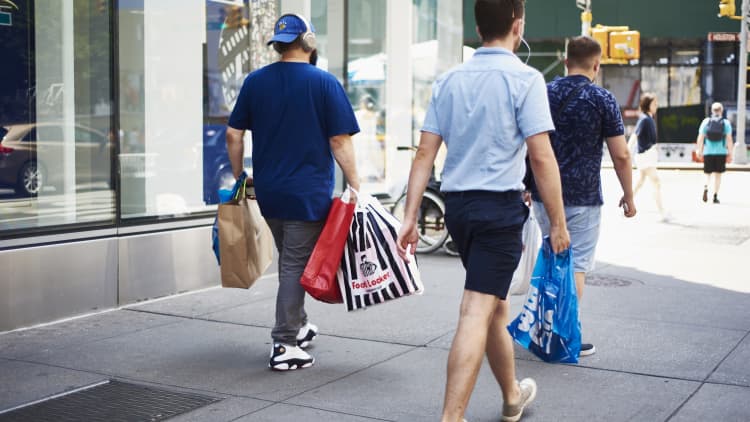Southeast Asian e-commerce player Lazada said it received a record of over 3 million orders within the first 60 minutes of the mega 24-hour shopping event known as Singles Day or 11.11.
Lazada has operations in six regional markets: Singapore, Vietnam, Indonesia, the Philippines, Malaysia, and Thailand.
Parent company Alibaba, meanwhile, reported its gross merchandise volume (GMV) — a key industry metric measuring the total dollar value of merchandise sold online — surpassed last year's 213.5 billion yuan record (nearly $30.5 billion) on Monday afternoon local time. Lazada doesn't disclose its GMV separately.
Sea Group-owned e-commerce firm Shopee said its order volume tripled in the first hour compared with last year. A representative said the company could not disclose the aggregate number of orders it received in that time frame since the event is still ongoing.
The shopping extravaganza started in China a decade ago but has since been adopted by retailers in Southeast Asia.
Southeast Asia's internet economy
E-commerce, along with ride-hailing, are said to be the main drivers of Southeast Asia's internet economy, which, according to a popular industry report, is predicted to reach $300 billion by 2025.
A report from Forrester Research said online retail in the region will grow from $19 billion in 2018 to $53 billion by 2023, accounting for 6.5% of all retail sales. Most of those online retail sales will come from mobile.
"It's definitely fast-growing and we also see marketplaces dominate," Xiaofeng Wang, a senior analyst at Forrester Research, told CNBC by phone.
Marketplace refers to a type of e-commerce business model where a company builds a platform — a marketplace — where buyers and third-party sellers carry out transactions, unlike online retailers who mostly sell their own products on their websites.
"We also see marketplaces consolidating," Wang said. "A lot of smaller marketplaces are either gone or got merged. Now, we're left with really the top-tier players and a few smaller niche players."
Helming the growth of e-commerce in the region are companies like Lazada, Shopee and Indonesian players Tokopedia and Bukalapak.
Experts say the region is lucrative for internet companies because of its high smartphone penetration rate, improving internet connectivity and a growing population. In retail, most of the shopping today is still done offline, which leaves plenty of room for e-commerce companies to acquire new customers, especially in Southeast Asia. At the same time, offline retailers are also going digital and embracing new technologies.
"Basically, e-commerce and new retail are happening at the same time in Southeast Asia," Wang said, referring to the concept of blending online and offline sales channels, which was pioneered by Alibaba.
Optimistic outlook
Pierre Poignant, chief executive officer at Lazada Group, told CNBC in an interview before Singles Day that the company's focus at the moment is growing its customer base.
The company said as of Aug. 31, it had more than 50 million annual active users in its six markets.
"There's a conjunction of factors that are accelerating the digitization of the economy — the growth of the region, the macro environment. The consumers' habits that are changing, high levels of investment in the region, all of these put together leads to accelerated growth," Poignant said, adding, "We're very confident for the future on the back of this."
Junjie Zhou, chief commercial officer at Shopee, shared a similar level of optimism toward the region's e-commerce market.
"This market is still at a fast-growing stage," Zhou told CNBC in an interview before Singles Day. "If you look at online retail (portion) of the overall retail space, it's still a very, very small percentage. But, at the same time, it's growing much faster compared to traditional offline retail."

"At the moment, at least for the near future, Shopee's priority is to grow to a much bigger size, and to capture more market share, and strengthen our lead position in this e-commerce space," Zhou explained.
Standing out from the competition
For Lazada and Shopee, the priority is to acquire more customers as they connect to the internet for the first time, likely through a smartphone.
Both companies have mobile apps that are designed with interactive features and social games to keep users on the platform longer and more engaged. Lazada, for example, has a feature where users can assemble the help of their friends to "slash" an item's price. When enough people have participated, they can buy that item at a discounted rate. Shopee, meanwhile, introduced an augmented reality-based feature where users can "catch" items on their screens to win coins and prizes.
Wang explained the concept was first started by Chinese e-commerce firm Pinduoduo to acquire new users. "They started social commerce, social sharing. Then basically all incumbent players, Taobao, T-Mall, everyone is adopting this tactic. It's quite effective in terms of acquiring new customers," she said.

Shopee's Zhou said users on average spend more time on his company's app, than when compared with other shopping apps.
"They could be browsing, they could be looking for certain things, but they could also be playing certain games that we have and some other interactive features that we have," he said.
When asked what makes Shopee stand out from competitors, Zhou said the company has an advantage in its local understanding of each market.
"At the same time, we're still a regional player. So, compared to some other pure local players, I think we have: one, of course, more resources, financially, as well as the product technology," Zhou said.
Lazada's Poignant said his company's advantage lies in the backing it has from Alibaba: From building a logistics network by integrating with Alibaba's massive Cainiao business to looking into digital payment options that could be supported by Alibaba-affiliate Ant Financial.
"At the back of it is the technology platform that we have. We have adopted (it) from the Alibaba Group, that's a massive differentiator," Poignant said.
Ultimately, e-commerce players that are backed by big companies will thrive in the region as competition heats up with companies trying to outdo each other to gain market share, Forrester's Wang said.
"In the end, players who have deeper pockets will stay," she added.



